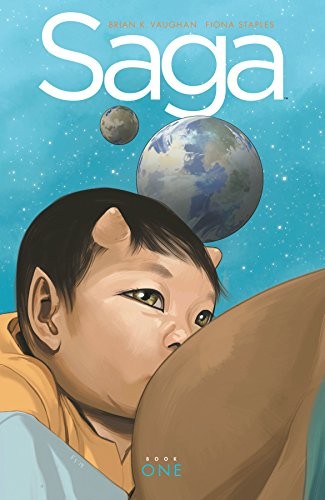Smileybone finished reading Saga, Book One by Brian K Vaughan

Saga, Book One by Brian K Vaughan, Fiona Staples
The story of Hazel, a child born to star-crossed parents from opposite sides of a never-ending galactic war. Now, Hazel's …
This link opens in a pop-up window

The story of Hazel, a child born to star-crossed parents from opposite sides of a never-ending galactic war. Now, Hazel's …
While not as epic as The Broken Earth trilogy, this N.K Jemisin series goes very deep into the nature of power, religion, divinity, and so many other things, in a series that's mostly just characters talking to each other and thinking thoughts. There's a revolution against Light and Order (which, it turns out, are pretty authoritarian things when taken to the extreme). There's dismantling of good-evil binaries. There's a LOT of queer sex. Brilliant.
R. F. Kuang's Babel is actually much more than an indictment of colonialism, although it performs that job magnificently. Novels abound on the struggles of immigrants from the Global South once they have reached the supposed land of the free; their struggle to fit in, their identity crises, and their disillusionment with what the West has to offer.
Babel is focused on essentially a 1830s version of Western liberal arts education. Four students in Oxford struggle to balance their desperate eagerness to learn and take advantage of the enormous resources at their disposal, with the imperialist ends that their skills are put toward.
Where Kuang departs from most is by asserting that you can never actually strike that balance - and, in fact, that you should not. Where she truly elevates beyond almost every other book on the subject is by charting an actual path of unambiguous resistance for the …
R. F. Kuang's Babel is actually much more than an indictment of colonialism, although it performs that job magnificently. Novels abound on the struggles of immigrants from the Global South once they have reached the supposed land of the free; their struggle to fit in, their identity crises, and their disillusionment with what the West has to offer.
Babel is focused on essentially a 1830s version of Western liberal arts education. Four students in Oxford struggle to balance their desperate eagerness to learn and take advantage of the enormous resources at their disposal, with the imperialist ends that their skills are put toward.
Where Kuang departs from most is by asserting that you can never actually strike that balance - and, in fact, that you should not. Where she truly elevates beyond almost every other book on the subject is by charting an actual path of unambiguous resistance for the protagonists, against the imperial machine they are brought in to serve and benefit off of (students from colonised countries in American liberal arts colleges: take good note).
There is, after all, a reason for the subtitle to contain the words "necessity of violence" and "revolution."
P.S The fantasy world-building, linguistic nerdity, character development, and general writing are also excellent.